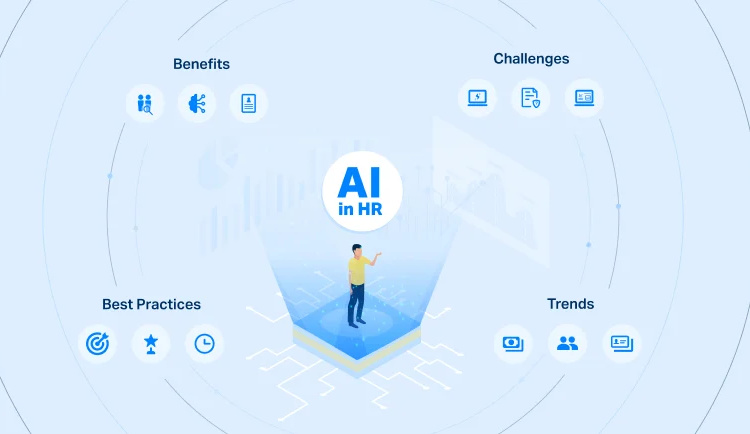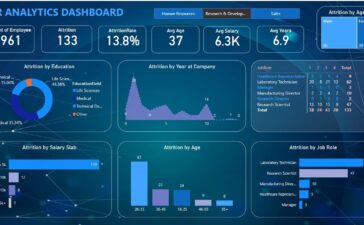Here’s a polished and complete version of your blog:
Introduction
The evolution of the internet and the expansion of data collection capabilities have transformed various aspects of business operations, extending far beyond human resources. The rise of Artificial Intelligence (AI) and Machine Learning (ML) has particularly impacted HR departments, significantly reducing the need for manual tasks while boosting efficiency. Jeanne Meister, co-author of The Future Workplace Experience, captures this shift succinctly: “AI will augment HR and give HR time to work on more strategic business issues. The opportunity is to use AI to streamline HR manual processes and provide a more consumer-grade service to employees.”
In late 2020 and early 2021, a surge in HR technology underscored the importance of effective HR operations and overall employee well-being. With remote work becoming a staple in 2024, many trends that emerged during the COVID-19 pandemic are likely to continue. Hybrid work models remain prevalent, and HR tech start-ups leveraging ML and AI will continue to thrive.
Table of Contents
- Benefits of AI and ML Tools for HR
- AI and People Analytics
- 15 AI and ML Tools for HR Professionals in 2024
- How Can HR Professionals Level Up Their Careers Using ML and AI?
- Conclusion
- Frequently Asked Questions
- Q1. What are HR technology trends in 2024?
- Q2. What is the future of AI in HR?
- Q3. What is the future of HRM in 2025?
- Q4. What is the use of AI and ML tools for HR Management?
Benefits of AI and ML Tools for HR
AI and ML tools have revolutionized HR operations by enhancing decision-making, automating daily tasks, and improving hiring processes. Here’s how these technologies benefit HR professionals:
- Better Job-Candidate Matching: AI and ML analyze resumes, job descriptions, and candidate data to match potential hires more effectively with open positions.
- Automation of Daily Tasks: Routine operations such as resume screening, candidate sourcing, and interview scheduling are automated, freeing HR professionals to focus on strategic tasks.
- Predictive Analysis: AI-driven analysis identifies trends and patterns, such as turnover rates and employee engagement, enabling data-driven improvements in HR practices.
- Enhanced Employee Engagement: AI tools analyze employee sentiment and engagement, helping HR pinpoint areas needing attention and develop strategies to boost satisfaction.
AI and People Analytics
People analytics involves using data to improve business and talent outcomes. This field has evolved since the early 20th century, where scientific management principles first emphasized productivity through data. Today, people analytics harness AI to sift through vast amounts of data, offering insights into employee performance, turnover, and engagement.
AI enhances people analytics by automating data analysis and generating predictive models. For instance, AI can analyze employee data to identify turnover trends or performance issues, helping HR departments make informed decisions about hiring, training, and development.
15 AI and ML Tools for HR Professionals in 2024
- Pymetrics: Uses neuroscience-based games to assess candidates and match them with suitable jobs. Pricing is not publicly disclosed.
- AmazingHiring: AI-powered search and sourcing tool with collaborative recruitment features. Approximately $4800 annually.
- ICIMS Talent Cloud: An all-in-one HR platform offering an ATS, recruitment marketing, and integrations. Around $1,700/month.
- Oracle Recruiting: Part of Oracle’s HCM Cloud, offering onboarding, reporting, and analytics. Pricing details are not publicly disclosed.
- Skillate: AI-driven resume screening and job matching, with insights and analytics. Pricing is not publicly disclosed.
- Textio: Enhances writing with real-time language analysis and feedback for job postings. Starts free, with charges based on usage.
- Eightfold: Manages candidate experience and career mobility with real-time analytics. Pricing is project-based.
- HireVue: Offers pre-employment assessments, interviewer training, and video interviews. Starting at $35,000 annually.
- Entelo: Provides candidate sourcing, diversity and inclusion features, and CRM. Starting around $150 per month.
- Talenture: An applicant tracking system with collaborative hiring and talent management. Basic plans start at $19/month per employee.
- iMocha: Offers a vast library of skill assessments and AI-powered analytics. Pricing ranges from $5,000 to $25,000 annually.
- Harver: Focuses on volume hiring with pre-employment assessments and video interview scheduling. Pricing details available upon request.
- OneModel: Provides data visualization, security, and customization for HR data analysis. Contact the vendor for pricing details.
- Whatfix: Digital adoption platform offering contextual help and interactive guides. Pricing is project-specific and based on user licenses.
- intelliHR: Offers performance management, employee engagement, and compliance management. Plans start at $5.5 per employee per month.
How Can HR Professionals Level Up Their Careers Using ML and AI?
HR professionals can leverage ML and AI to advance their careers in several ways:
- Predictive Analytics: Utilize ML to analyze workforce data and predict trends, helping to develop proactive strategies for employee management.
- Enhanced Employee Engagement: Use AI tools to analyze feedback and sentiment, identifying and addressing sources of dissatisfaction.
- Automate HR Functions: Automate routine tasks to focus on strategic initiatives, increasing efficiency and reducing human errors.
Conclusion
AI and ML are transforming HR by automating tasks, improving accuracy, and providing valuable insights into workforce trends. To leverage these technologies effectively, HR professionals must gain proficiency in using AI and ML tools. For further learning, Analytics Vidhya offers a wealth of resources, including video tutorials, blogs, and a community of data science professionals.
Frequently Asked Questions
- What are HR technology trends in 2024?
Trends include automation with AI and ML, remote working, HR data analytics, predictive analytics, employee experience management, and attrition detection. - What is the future of AI in HR?
AI will continue to enhance HR functions by automating processes, providing predictive insights, and improving employee engagement. - What is the future of HRM in 2025?
HRM will increasingly integrate advanced technologies, focus on employee experience, and use data-driven strategies to enhance organizational effectiveness. - What is the use of AI and ML tools for HR Management?
AI and ML tools streamline HR processes, enhance decision-making, and provide actionable insights for better workforce management.





